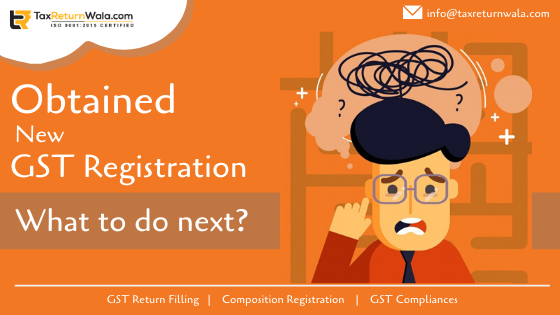Obtained New GST Number – What to do next?
The looming question for every entrepreneur today is ‘I have just obtained New GST Number for business, Now! What’s the next step should I initiate for?’
It’s a hard task for a layman to keep up with all ups and downs of business and then also take care of his duties, he possesses towards the society and the legal environment. An application for a ‘New GST registration’ also brings in certain additional responsibilities and a diligent communication of the taxpayer with the authorities. But being a responsibility in favor of economy, maintaining reports and timely filling of GST is also necessary.
Once you have obtained New GST Number (GSTIN) (If still not, connect to our GST expert at info@taxreturnwala.com), there is much more you have to keep yourself up with.
1. Enable Digital Signature Certificate (DSC) or EVC (Electronic Verification Code ) for time-bound interactions :
The Common Portal requires a mandatory verification method for filling/ submissions for different applications & returns and other interactions with the GST department. It includes e-verification by way of a Digital Signature Certificate or an Electronic Verification Code. The same has to be essentially submitted at the official portal of GST either during registration or just after registration
It can be done by logging in to the GST portal and locating to My Profile > Register/Update DSC.
2. Place a Hard Copy at your Business Premises :
A necessary requirement of the GST law is – to enable transparency and legally compliant by removing the hesitation of appearing before legal authorities with multiple documents and registrations for checks and approvals. A single GST registration displayed in place of business complies requirements. It is essential to place a hard copy of the GST registration certificate at any prominent place.
3. Issue GST invoices to avail benefit and be compliant :
The taxpayer must keep himself updated on the tax policy changes and the right way of their compliance. It is better suggested to have an online tax service providing agency on board. Consult for the right way of placing your GST invoices and maintaining records of GST transactions with our tax consultant.
Issue invoice with fulfilling all minimum criteria in terms of mentioning Serial Number, GST number of the buyer, mentioning of an applicable tax rate, bifurcation of the tax rate in case of Central GST/ State GST or Integrated GST, signed by authorized signatory and other relevant details as prescribed.
Note: Issuing an invoice without fulfilling minimum criteria fails to claim the same. Make sure you get the correct invoice from the seller.
4. Charge GST and file GST returns duly on time :
For each sale or purchase made, keep a systematic record of all transactions made with GST with the help of our bookkeeper, we provide all bookkeeping and accounting services.
File the right GST returns for purchases, sales made during the particular month/quarter/year before due dates. A Nil return is mandatory to be filed in case no sale or no purchase for the specific period of return has been made. Check the required GST return to form for your business and the due dates here.
Note: The GST department adds a day-wise penalty for non-filling of returns on due dates.
5. Claim Input Tax Credit:
The registered taxpayer under GST can claim the input tax credit on tax i.e., for CGST/SGST or IGST paid on purchases made for stock lying within 30 days of receiving the registration form the GST department.
The Form ITC 01 filled with required details includes details of stock in hand as on date ( in case of becoming liable for GST registration, date immediately preceding the date when he liable to pay), the type of goods not applicable on services, code, quantity, invoice value, the tax amount paid among other details.
The input tax credit can be claimed in a specified time period as applicable in different scenarios.
6. Maintain proper records and accounts :
A taxpayer needs to keep a due record of the books of accounts of business and returns filed for up to 72 months from the filing of GST Annual return. The law strictly affirms for legal checks at the place of business, which calls the GST officer to ask for documents including purchase books, sales books, credit claims, taxes paid, etc. at any particular time.
Also, all books and records have to be kept at the specific place of business registered on the GST portal.
Hence, as a taxpayer of GST one must keep different timelines to avoid penalties and for claiming a refund on taxes paid, the rules applicable.
Central Board of Excise & Customs (“CBEC”) issues timely flyers, and FAQs to educate the taxpayer of procedure and changes made therein. You can contact us for any GST related information or guidance for your organization.
Start your business journey with compliance support of Taxreturnwala.com
Queries on GST solved in no time
Email: info@taxreturnwala.com


